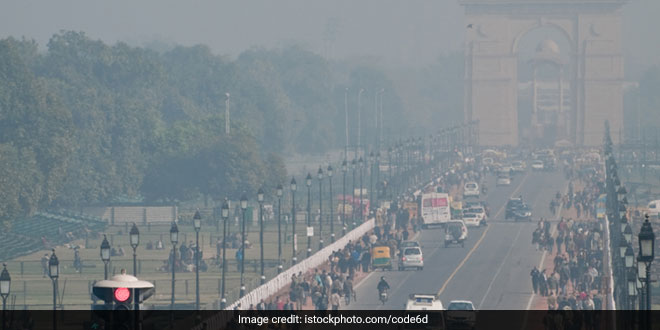Highlights
- Stubble burning contributed to 17% of Delhi's PM 2.5 on Sunday: Govt
- 1,230 farm fires in Delhi's neighbouring states recorded on Sunday: Govt
- Continuous effort needed to tackle Delhi’s air pollution: Prakash Javadekar
New Delhi: The national capital’s air quality was recorded in the “poor” category on Monday morning (October 19), even as pollution levels dipped slightly due to favourable wind speed. However, the share of stubble burning in the city’s pollution is likely to increase, according to the Ministry of Earth Sciences’ Air Quality Early Warning System for Delhi.
On Sunday, a central government agency reported 1,230 farm fires in Delhi’s neighbouring states – the maximum in a day so far this season.
The share of stubble burning in Delhi’s PM 2.5 pollution stood at 17 per cent on Sunday (October 18). It was 19 per cent on Saturday, 18 per cent on Friday, around one per cent on Wednesday and around 3 per cent on Tuesday and Monday.
The city recorded an air quality index (AQI) of 232 at 8:45 am on Monday. The 24-hour average AQI was 254 on Sunday. It was 287 on Saturday, 239 on Friday and 315 on Thursday, the worst since February 12 (AQI 320).
An AQI between 0 and 50 is considered ‘good’, 51 and 100 ‘satisfactory’, 101 and 200 ‘moderate’, 201 and 300 ‘poor’, 301 and 400 ‘very poor’, and 401 and 500 ‘severe’.
During daytime, winds are blowing from the northwest, bringing pollutants from farm fires. At night, calm winds and low temperatures are allowing the accumulation of pollutants, according to an India Meteorological Department official.
The Ministry of Earth Sciences’ Air Quality Early Warning System for Delhi said the ventilation index, a product of mixing depth and average wind speed, was 11,500 metre square per second on Sunday and is likely to be 10,000 metre square per second on Monday which is favourable for the dispersion of pollutants.
Also Read: Gurugram, Faridabad To Have Pollution Control Rooms Functioning Round The Clock
Mixing depth is the vertical height at which pollutants are suspended in the air. It reduces on cold days with calm wind speed. A ventilation index lower than 6,000 sqm/second, with an average wind speed of less than 10 kmph, is unfavourable for the dispersal of pollutants.
According to the Air Quality Early Warning System for Delhi, the impact of stubble burning is “restricted because of better mixing height and ventilation”, but it is likely to rise on Monday.
Union Environment Minister Prakash Javadekar had on Sunday said the pollution problem cannot be resolved in a day and continuous efforts are needed to tackle each of the contributing factors.
Interacting with people during a Facebook Live event, he said the major factors behind air pollution in the country are traffic, industries, waste, dust, stubble, geography and meteorology. The Central Pollution Control Board (CPCB) has said meteorological conditions in Delhi have been “extremely unfavourable” for the dispersion of pollutants since September as compared to last year.
(Except for the headline, this story has not been edited by NDTV staff and is published from a syndicated feed.)
NDTV – Dettol Banega Swasth India campaign is an extension of the five-year-old Banega Swachh India initiative helmed by Campaign Ambassador Amitabh Bachchan. It aims to spread awareness about critical health issues facing the country. In wake of the current COVID-19 pandemic, the need for WASH (Water, Sanitation and Hygiene) is reaffirmed as handwashing is one of the ways to prevent Coronavirus infection and other diseases. The campaign highlights the importance of nutrition and healthcare for women and children to prevent maternal and child mortality, fight malnutrition, stunting, wasting, anaemia and disease prevention through vaccines. Importance of programmes like Public Distribution System (PDS), Mid-day Meal Scheme, POSHAN Abhiyan and the role of Aganwadis and ASHA workers are also covered. Only a Swachh or clean India where toilets are used and open defecation free (ODF) status achieved as part of the Swachh Bharat Abhiyan launched by Prime Minister Narendra Modi in 2014, can eradicate diseases like diahorrea and become a Swasth or healthy India. The campaign will continue to cover issues like air pollution, waste management, plastic ban, manual scavenging and sanitation workers and menstrual hygiene.
[corona_data_new]





























